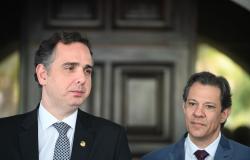A federal government program to increase tourism across the country, Voa Brasil can be a good way to stimulate the airline market, but it needs to be accompanied by a discussion on how to deal with the issues that make air tickets very expensive, according to John Rodgerson , CEO of Azul.
“I see Voa Brasil with good eyes, but we want to address the problems in the sector, which prevent the Brazilian market from growing”, said the executive this Thursday, March 28, in a press conference, due to the release of the results of the fourth quarter of 2023. “Brazil grows less than Chile, for example.”
Announced last year, and with its launch postponed several times, the Voa Brasil program aims to offer air tickets of up to R$200 for students registered with Prouni and retirees.
For Alex Malfitani, Azul’s CFO, the program could be good for the public and the industry, if tickets are issued at times and days with little demand, requiring more flexibility from the public. “We are looking for smart ways to guarantee revenue,” he said.
Despite this, he highlighted that a permanent and lasting solution to air ticket prices in Brazil depends on dealing with issues such as taxation and fuel prices. “Brazil has the most expensive kerosene in the world. If it were the richest country in the world, it would make sense, but how is an emerging country going to grow the market if it has the most expensive kerosene in the world?”, he said.
Another federal government initiative aimed at the airline sector, the credit line of up to R$8 billion to assist companies after the impacts of Covid-19, was also commented by Rodgerson.
Azul’s CEO said that he and executives from other companies will be in Brasília, next week, to talk about the matter with the Ministry of Finance. Rodgerson highlighted that the conversations are positive, but he hopes that long-term measures will also come for the segment.
In relation to Azul, Rodgerson highlighted that, after the effects of the pandemic and the adjustments made to make the company more efficient, the focus was once again on growth, amid a positive market scenario. “Demand should grow, because Brazil is growing again,” he said.
Given this context, Azul intends to strengthen the hubs in Belém, Cofins and Recife, in addition to planning an expansion of operations. “We serve more than 160 cities and we intend to open to ten more cities this year,” he said, highlighting that the company has 11 to 13 aircraft to receive by the end of the year.
Regarding speculation involving the purchase of Gol, which is in judicial recovery, the executives declined to comment.
Azul closed the fourth quarter with a net profit of R$403.3 million, an increase of 74.5% compared to the same period in 2023. The balance sheet was not audited and the company informed that the work of independent auditors has not yet been completed. concluded. Net revenue grew 13%, to R$5 billion, while Ebitda increased 33.7%, to R$1.4 billion.
In the year, Azul recorded a net loss of R$700.3 million, an improvement of 49.2% compared to 2022. Revenue rose 17.2%, to R$18.7 billion, and Ebitda grew 61.4 %, to R$5.2 billion.
The company ended the quarter with total liquidity of R$6.1 billion, an increase of 3.2% on an annual basis, while net debt rose 5.1%, to R$19.3 billion, on the same basis of comparison. Financial leverage fell from 5.7 times to 3.7 times.
At around 3:20 pm, Azul’s preferred shares fell 6.87%, to R$13.15. In the year, they fell 10.4%, taking the company’s market value to R$4.87 billion.





